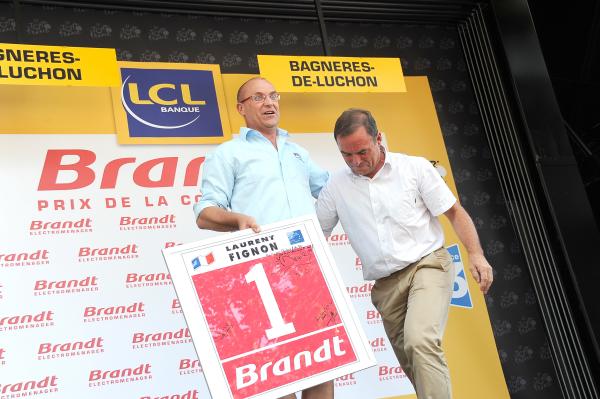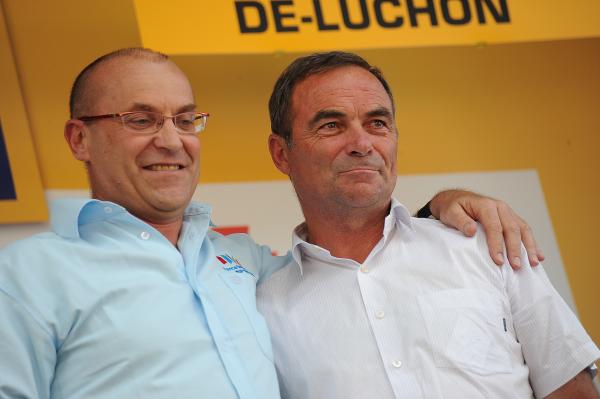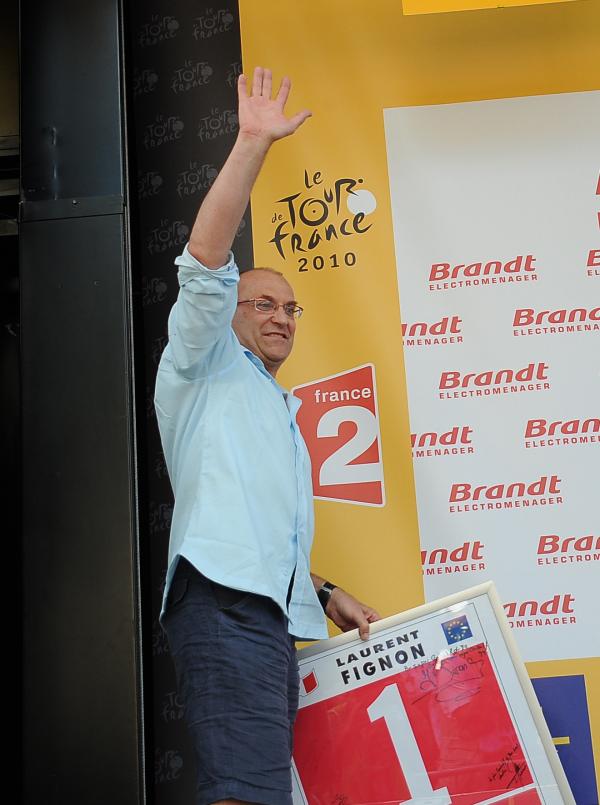Hinault leads Fignon tributes
Leblanc, Bernard, Gallopin, Boyer and Armstrong remember Tour champion



Five-time Tour de France winner Bernard Hinault has led tributes to the late Laurent Fignon, who died today after a battle with cancer. He was fifty years old.
“I’m moved, and everybody who loves cycling is moved,” Hinault told i-Télé. “We were teammates before being rivals, one against the other. He always fought to win. This time he fought and he has lost.”
Hinault was Fignon’s team leader when he turned professional with the Renault-Elf team. After Hinault moved to La Vie Claire, he was defeated by his former protégé in a memorable duel at the 1984 Tour de France.
The pair appeared on the podium at this year’s Tour de France after stage 15 to Bagneres-de-Luchon when Hinault presented Fignon with a special combativity prize in a poignant recognition of his battle with cancer.
Former Tour de France director Jean-Marie Leblanc was similarly moved by Fignon’s passing and he was keen to pay tribute to the champion’s panache, on and off the bike.
“Cycling is a big family and when a young former champion dies at just fifty years of age, it cannot but move us,” Leblanc said on the France Info radio station. “His death has come too quickly and too soon.”
After an already promising start to his professional career, Fignon burst into the limelight with victory at the 1983 Tour de France. He repeated the feat the following year with one of the most stylish displays in Tour history and Leblanc’s fondest memories of Fignon the rider stem from this period.
Get The Leadout Newsletter
The latest race content, interviews, features, reviews and expert buying guides, direct to your inbox!
“His first Tour win in 1983 was a victory for youth, audacity and talent,” Leblanc said. “Fignon had character and panache. To win his first Tour at just 23 years of age was remarkable.”
Leblanc also viewed the emergence of Fignon in the early 1980s as symbolic of a new era in cycling, with his victory over Bernard Hinault in 1984 being a watershed moment for the sport.
“If you will allow me to use something of a caricature, Hinault was the Last of the Mohicans of the great generation of the classic champions, while Fignon was the precursor of the modern champions with more panache and impertinence,” Leblanc explained.
Jean-François Bernard, one of Fignon’s rivals from the French peloton in the 1980s, also paid tribute to one of the great personalities in the sport’s history when he spoke to France Info. “Laurent was a fighter,” Bernard said. “Even though I was always on different teams than Laurent, I could still see that he was a rival who would never give in.”
Cofidis manager Eric Boyer, who rode with Fignon at Cyril Guimard’s legendary Renault and Système U teams, had fond memories of his friend.
“He was a patron, he was a fighter. He was never on the defensive and always on the attack,” Boyer said. “I remember his courage, when we trained together in the rain, the cold, the ice.”
Boyer also recalled Fignon’s contribution to cycling after he hung up his wheels, which included his popular analysis on French television and his organisation of Paris-Nice earlier in the decade. “He had the stuff of champions, but Laurent was also a very cultured man. He had a thousand ideas for cycling.”
Fignon analysed this year’s Tour de France for France Television and his colleague Gérard Holtz spoke of his “formidable courage” in carrying out his commentary duties while undergoing treatment for cancer.
“He was honest, sincere and direct, and a huge plus for our team,” Holtz said. “He was an enormous champion right to the end. He had lost a huge amount of weight and could barely talk, but right to the end he showed the resistance of a champion.”
Armstrong and Gallopin remember a legendary cyclist
RadioShack directeur sportif and former professional rider Alain Gallopin was a close friend of Fignon and worked as his masseur before going into team management.
“I’ve lost a brother today,” he told L’Équipe. “I saw a fighter right to the end. Yesterday morning I heard that he was still fighting and that he was looking for information on his treatment. After that, his state deteriorated. This morning I heard that it was over.”
“He was still conscious yesterday afternoon. He knew who was there and he spoke through signals. Everybody was prepared for his death, because in the past year and a half a lot of treatments were tried that didn’t work,” Gallopin continued.
“It became more and more complicated. He gave all that he could. When he told me that he had cancer a year and a half ago, he said to me, ‘in any case, I have no fear of dying.’”
RadioShack rider Lance Armstrong had helped to organise an appointment with an oncologist for Fignon in the United States this year, and he responded via Twitter to the news of Fignon’s death.
“Just woke to the news that Laurent Fignon has passed on. He was a dear friend and a legendary cyclist. We will miss you, Laurent. RIP LF,” he wrote.
The pair first met in Paris in January 1996 after the Cofidis team presentation, when Armstrong was himself battling cancer. Fignon invited the young American to dinner, an episode recounted in his autobiography We Were Young and Carefree.

Barry Ryan was Head of Features at Cyclingnews. He has covered professional cycling since 2010, reporting from the Tour de France, Giro d’Italia and events from Argentina to Japan. His writing has appeared in The Independent, Procycling and Cycling Plus. He is the author of The Ascent: Sean Kelly, Stephen Roche and the Rise of Irish Cycling’s Golden Generation, published by Gill Books.